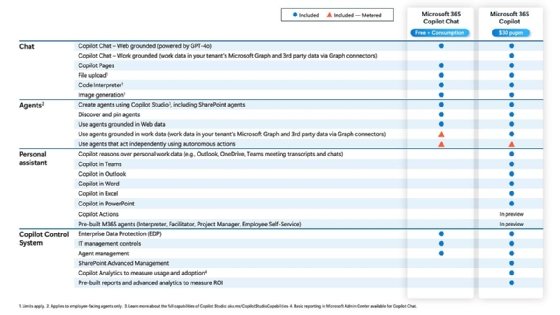
Getty Images/iStockphoto
Google lowers Gemini pricing, pressuring Microsoft Copilot
Google introduces new Gemini pricing in Workspace, making AI features available at $14 per user, per month, challenging Microsoft's Copilot in 365.
Google has significantly reduced the cost of using Gemini in Workspace by making the multimodal AI model a feature within the cloud-based productivity and collaboration suite. The move follows a market trend that's pressuring Microsoft to rethink pricing for Copilot AI in Microsoft 365, an analyst said.
Starting Thursday, new Business Standard subscribers will get Workspace with Gemini for $14 per user, per month -- $2 more than the previous plan without the AI model. The Business Plus subscription will cost $22 per user, per month -- $4 more than the previous plan.
Google will update pricing for existing customers starting March 17, the company said.
Before the new subscriptions, companies paid $32 per user, per month, for Gemini Business, which Google embedded in Workspace tools including Gmail, Docs, Sheets, Chat and Meet. Model-powered capabilities included email summaries, note-taking during online meetings, and assistance in creating slides and spreadsheets. Gemini also enhanced audio and video recordings.
Gemini is a direct competitor of OpenAI's GPT-4o, which Microsoft uses in Copilot. Google hasn't said how many people use Gemini. In December, OpenAI reported that its online chatbot, ChatGPT, had 300 million weekly users.
Google's new Gemini pricing is more attractive than the $30 per user, per month, that companies pay for Copilot in 365. Such a difference will lead companies to pressure Microsoft to change its pricing for Copilot before agreeing to expand its use within the enterprise, Forrester Research analyst J.P. Gownder said.
After talking to more than 140 enterprises, he found that most have Copilot licenses for only a small portion of employees, not across the enterprise.
"They're not penetrating deeply into the organization," Gownder said of Microsoft. "Only a handful of people get a license."
Also, significantly reducing pricing will help justify trying Copilot, despite the difficulty of measuring ROI. Formulating ROI requires a lot of work, and "even then, it's hard to know for sure," Gownder said.
Microsoft is also up against the trend in the office productivity and collaboration market to make AI a software feature instead of a paid add-on. With the latest pricing changes, Google took a big step in that direction, following rivals such as Zoom.

Despite market pressures, Microsoft has some leverage with customers because of the challenges they face when switching from 365 to Workspace.
All the development that went into customizing 365 for an organization cannot be migrated easily to Workspace. Also, the two can't be managed as one suite, so adding Workspace for some employees would introduce more complexity to the IT environment.
"[Pricing] is not solving the problems that make it hard to switch, despite Google's best efforts to create migration tools," Gownder said.
Microsoft's new Copilot agents
On Wednesday, Microsoft introduced 365 Copilot Chat, which includes pay-as-you-go agents for commercial customers. The company's introduction of agents into Copilot could also affect pricing in the future, Gownder said.
"There are a lot of different ways that Microsoft can monetize this because of the growth of the agent prospect," he said. That option didn't exist six months ago.
Copilot Chat lets people use natural language to create agents to automate repetitive tasks and business processes, Microsoft said. For example, a customer service rep can ask for account details before a customer meeting, and field service workers can request product information stored in SharePoint, Microsoft's content management system.
IT departments can use Microsoft Copilot Studio to build organization-wide agents and manage deployment.
Enterprises could find it easier to determine the ROI on agents because they target specific tasks. On the other hand, a general AI tool like Copilot is more difficult to pin down because it performs many small tasks in software, Gownder said.
Antone Gonsalves is an editor at large for Informa TechTarget, reporting on industry trends critical to enterprise tech buyers. He has worked in tech journalism for 25 years and is based in San Francisco. Have a news tip? Please drop him an email.








